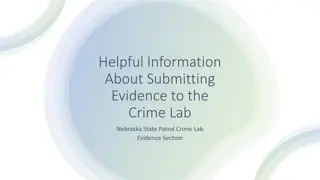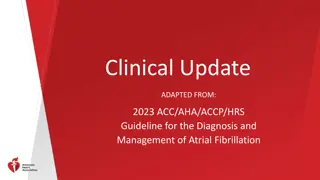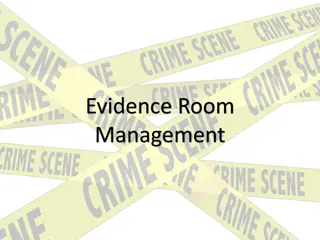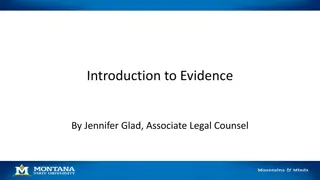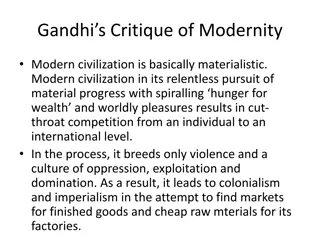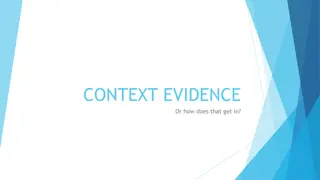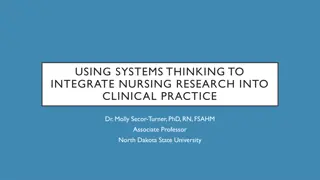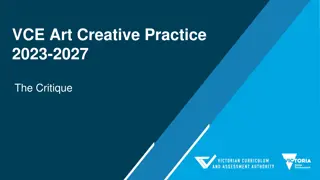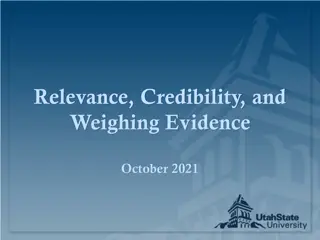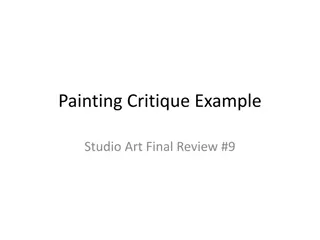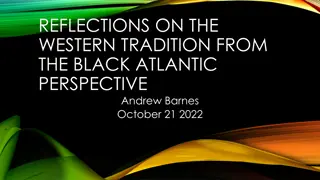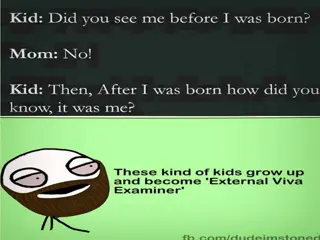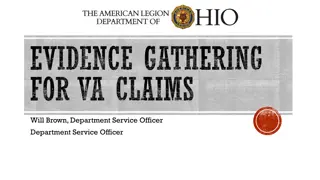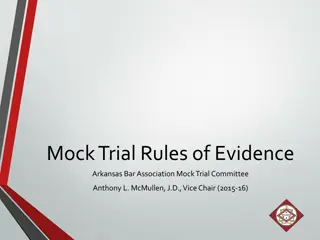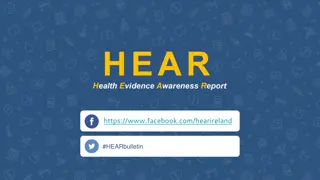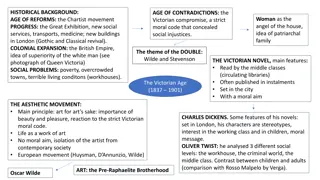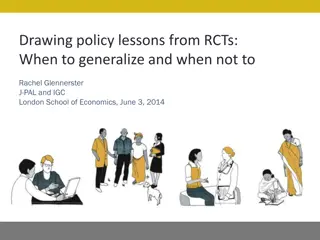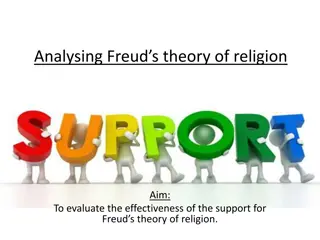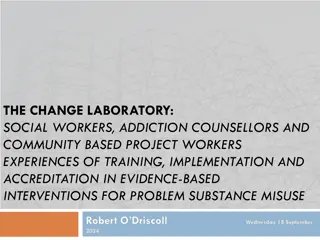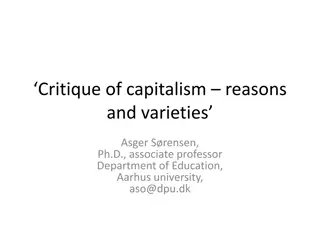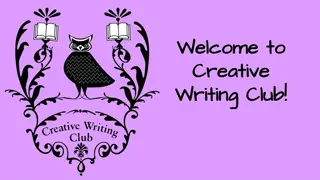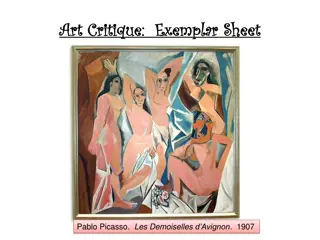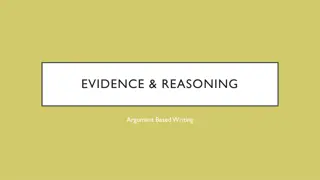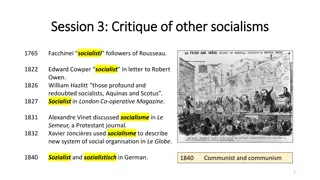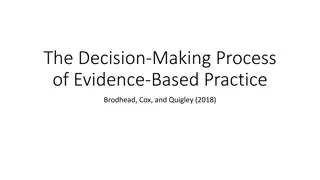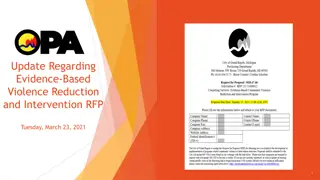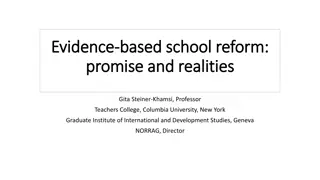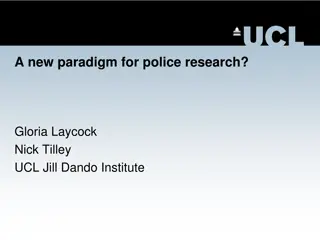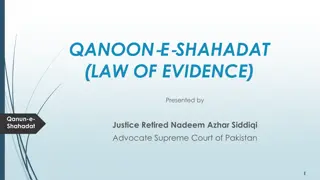The Role of Artifacts and Evidence in Educator Evaluation and Support
Exploring the role of artifacts and evidence in educator evaluation, this content covers the three categories of evidence required by the Oregon Framework. It delves into the efficient process that reduces redundancy, essential components of SLG goals, and the types of evidence relevant to professio
0 views • 15 slides
Understanding Impression Evidence Collection in CSI Investigations
Impression evidence plays a crucial role in investigations, including shoeprints, tool marks, tire tracks, bite marks, and riffling marks on bullets. This evidence can be collected in 2D using photography or tape lifts, and in 3D through casting methods. Differentiating between class and individual
0 views • 21 slides
Helpful Information About Submitting Evidence to the Crime Lab.
Helpful information about submitting evidence to the Nebraska State Patrol Crime Lab's Evidence Section. Learn about the NSP 750 Evidence Submittal Form, submission process, and guidelines for resubmissions. Ensure all necessary details are provided for proper analysis of evidence.
5 views • 16 slides
Illegally obtained evidence
Illegally obtained evidence refers to evidence acquired through unlawful means, such as searches without warrants or extraction under duress. The Fruit of the Poisonous Tree doctrine renders evidence inadmissible if derived from illegally obtained evidence. The Exclusionary Rule prohibits the use of
2 views • 30 slides
Clinical Update
This clinical update provides recommendations for the diagnosis and management of atrial fibrillation adapted from the 2023 ACC/AHA/ACCP/HRS guidelines. It includes information on class strength of recommendations, levels of evidence, and phrases for writing recommendations based on the quality of e
0 views • 46 slides
Evidence Room Management
Explore the intricacies of evidence room management in a law enforcement setting, including the roles of individuals like Greg Van Buskirk, differences in crime scene management between large and small departments, the distinction between property and evidence, the importance of maintaining chain of
0 views • 8 slides
Understanding Evidence in Investigations
Learn about the principles and types of evidence in investigations, including inculpatory and exculpatory evidence, physical, documentary, demonstrative, and verbal evidence. Explore sources of evidence and the significance of collecting relevant information to ensure a fair investigative process.
0 views • 14 slides
Gandhi's Critique of Modernity: A Thoughtful Analysis
Gandhi's critique of modern civilization delves into the materialistic nature of modernity, highlighting its detrimental effects on society, individuals, and the environment. He argues that relentless pursuit of wealth and worldly pleasures leads to violence, exploitation, and domination, resulting
0 views • 16 slides
Understanding Context Evidence in Legal Proceedings
Context evidence in legal proceedings refers to evidence of acts not charged in the indictment, used to provide a background for understanding specific allegations. This type of evidence is often relied upon by the prosecution to explain events or behaviors that may seem isolated or surprising. It i
1 views • 13 slides
Integrating Nursing Research into Clinical Practice with Systems Thinking
Dr. Molly Secor-Turner emphasizes the importance of evidence-based practice (EBP) in nursing. EBP, derived from rigorous research, leads to quality patient outcomes by aligning services with current knowledge. The process involves identifying problems, critiquing evidence, implementing recommendatio
0 views • 21 slides
Understanding the Importance of Critique in VCE Art Practice
Explore the role of critique in VCE Art Creative Practice, focusing on structuring, presenting, and utilizing feedback for artistic growth. Discover interpretive lenses such as the structural, personal, and cultural perspectives that enhance analysis and interpretation of artworks within the context
0 views • 20 slides
Empowering Health Decisions and Care through OHDSI Community Collaboration
OHDSI's mission revolves around improving health by empowering a community to generate evidence that enhances health decisions and care. The journey to real-world evidence involves leveraging patient-level data in source systems and establishing reliable evidence. The OHDSI community is dedicated to
0 views • 5 slides
Understanding Evidence-Based Medicine and Clinical Decision-Making
European Patients Academy on Therapeutic Innovation emphasizes the importance of Evidence-Based Medicine (EBM) in providing optimum clinical care. EBM involves systematic review and utilization of clinical research for informed decision-making, benefiting patients in disease management and treatment
7 views • 20 slides
Understanding Relevance, Credibility, and Weighing Evidence in Decision-Making
Explore the importance of relevance and credibility in evidence assessment, the role of hearing panels in evaluating evidence fairly, and the responsibilities they hold. Learn about presenting relevant evidence, policy analysis, and identifying irrelevant evidence to ensure a thorough review process
6 views • 32 slides
Beach Gathering - Painting Critique and Analysis
A painting critique and analysis of a scene showing people gathered around a beach or lake, showcasing an older style of clothing. The artwork features a contrast of light and dark colors, painted in a pointillist style with different color values to depict textures and realistic scenes. The interpr
0 views • 7 slides
Mastering Claims, Evidence, and Warrants for Persuasive Writing
Understanding the concepts of claims, evidence, and warrants is crucial for constructing persuasive arguments. Claims represent positions to persuade, evidence supports claims with facts, and warrants bridge the gap between evidence and claims. An exercise is outlined to help practice forming claims
0 views • 8 slides
Needs Assessment Evaluation of NIH Critique Templates
Conducted by Consultant Concierge Corporation in June 2013, the needs assessment evaluates the utilization and potential improvements of NIH Reviewer Critique Templates within the Office of Extramural Programs and Office of Extramural Research at the National Institutes of Health. The evaluation foc
0 views • 39 slides
Understanding Biased Assimilation and Attitude Polarization in Social Disputes
People with strong opinions on complex social issues tend to interpret evidence in a biased manner, accepting confirming evidence readily while subjecting disconfirming evidence to critical evaluation. This can lead to increased polarization rather than narrowing of disagreement when exposed to the
0 views • 20 slides
Transformation of Quality Assessment Framework in Healthcare
The healthcare quality assessment framework is evolving with a new strategy focused on data-led, people's experiences, care integration, and safety culture. The current framework is transitioning towards a new approach by late 2023, incorporating separate registration and monitoring processes, five
0 views • 14 slides
Black Atlantic Perspective: Critiques and Affirmations within the Western Tradition
The Black Atlantic Perspective offers a unique critique from within the Western tradition, challenging Eurocentric narratives and promoting the ownership of Western civilization by marginalized voices. Rejecting the label of a slave race, this perspective embraces Christian humanism while condemning
0 views • 7 slides
Understanding Circumstantial Evidence in Legal Proceedings
Circumstantial evidence plays a crucial role in legal proceedings, allowing one to infer facts based on surrounding circumstances rather than direct proof. This type of evidence can be powerful in establishing the guilt or innocence of a person accused of a crime, complementing direct evidence for a
0 views • 39 slides
Understanding Evidence Gathering for VA Claims with The American Legion Department of Ohio
Evidence is crucial for VA claims, and it can come in various forms such as documents, written statements, photos, and video recordings. The framework for evaluating evidence includes factors like relevance, competence, credibility, and weight. Understanding the types of evidence, forms of relevance
0 views • 14 slides
Understanding Mock Trial Rules of Evidence
Mock Trial Rules of Evidence are crucial for determining the admissibility of testimony and evidence in a trial setting. Students preparing for cases need to assess evidence admissibility, make timely objections, and be prepared to defend testimony. The rules cover objections, specific objections ty
0 views • 36 slides
Collaborative Efforts of Irish Health Librarians in Providing Evidence-Based Practice Support
Current awareness newsletter freely available on the internet, providing high-quality, relevant information to healthcare professionals and consumers. This collaboration of Irish health librarians aims to promote evidence-based practice by offering up-to-date information and resources. The conscient
0 views • 12 slides
Victorian Literary Movement: Aestheticism and Social Critique
The Victorian era was marked by social reforms, colonial expansion, and contradictions like the strict moral code alongside social injustices. Literary figures like Charles Dickens, Oscar Wilde, and Robert Louis Stevenson illuminated these themes through novels exploring duality, hypocrisy, and soci
0 views • 4 slides
Making Informed Policy Decisions: Lessons from Randomized Controlled Trials
Policy makers face challenges in decision-making without complete evidence. Drawing on a Bayesian approach to evidence, combining different forms of evidence, and considering contextual factors can aid in designing effective policy interventions. Case studies like non-cash incentives for immunizatio
0 views • 18 slides
Critique of Freud's Theory of Religion: Examining Evidence and Key Criticisms
The analysis delves into Sigmund Freud's theory of religion, evaluating its support and challenges. The presentation highlights key criticisms regarding historical, anthropological, and psychological evidence, as well as Freud's conclusions on religion. Critiques focus on the lack of evidence for co
0 views • 19 slides
Experiences of Training and Implementation in Evidence-Based Interventions for Substance Misuse
This study explores the experiences of social workers, addiction counselors, and community-based project workers in training, implementing, and accrediting evidence-based interventions for problem substance misuse. The research delves into the challenges faced, including funding for accreditation, a
0 views • 23 slides
Critique of Capitalism: Reasons and Varieties by Asger Sørensen, Ph.D.
Asger Sørensen, Ph.D., delves into the critique of capitalism, exploring various perspectives such as political contestation, economic analysis, and value assessment. Through historical contexts and theoretical frameworks, Sørensen raises fundamental questions about capitalism's impact on freedom,
0 views • 10 slides
Welcome to PSU Creative Writing Club - Updates & Activities
Explore the latest announcements, office hours schedule, critique sessions, Kalliope literary journal details, and engaging writing activities from the PSU Creative Writing Club. Stay connected through social media and club events. Attend group novel meetings and submission deadlines for a variety o
0 views • 9 slides
Practice and Procedure in Judicial Review: Factual Evidence and Interveners
The content provides valuable insights into the practice and procedure regarding factual evidence and interveners in judicial review cases. It covers general rules, recent cases, applications for oral evidence, questioning witnesses, opinion evidence, and the role of interveners. Key points include
0 views • 28 slides
National Elf Service Launches to Revolutionize Access to Healthcare Evidence
The National Elf Service is introduced as a groundbreaking initiative to address the challenges in accessing and staying updated on healthcare evidence. It aims to combat misinterpretations and gaps in evidence, offering a reliable platform for professionals to stay informed. Through a series of inf
0 views • 14 slides
Analyzing Pablo Picasso's "Les Demoiselles d'Avignon" - Art Critique
In this detailed art critique, we explore Pablo Picasso's iconic painting "Les Demoiselles d'Avignon" from 1907. The description, elements of design, and analysis focusing on principles like balance, emphasis, and harmony provide insight into the organization and depth of this groundbreaking artwork
0 views • 6 slides
Effective Argumentation in Writing: Evidence and Reasoning
A comprehensive guide on utilizing evidence and reasoning in argument-based writing. Learn how to incorporate facts, quotes, and statistics from reliable sources to support claims, and how to analyze and explain the evidence to strengthen your arguments. Examples illustrate the importance of evidenc
0 views • 5 slides
Critique of Various Socialisms Throughout History
Critique various socialisms from history - including feudal socialism, petty-bourgeois socialism, and German or True Socialism. Discusses the origins, criticisms, and impact of these ideologies on societal structures and historical movements.
0 views • 14 slides
Understanding Evidence-Based Practice in Behavior Analysis
Definitions and analogies from the field of medicine help clarify the concept of Evidence-Based Practice (EBP) in Behavior Analysis. EBP involves integrating current best evidence with clinical expertise and client values to make informed decisions. The three-legged stool analogy illustrates the imp
0 views • 32 slides
Update on Evidence-Based Violence Intervention RFP Process
The City of Grand Rapids initiated an RFP process to implement an evidence-based violence reduction program, involving a review committee that assessed proposals based on established models. The committee decided to re-release the RFP with a focus on an evidence-based intervention model, ultimately
0 views • 6 slides
Structural Coupling between Science and Politics in Evidence-Based School Reform
This article by Gita Steiner-Khamsi explores the interplay between science and politics in evidence-based school reform, focusing on global public goods and the use of data and evidence in policy planning. It discusses the challenges and promises of evidence-based approaches, highlighting the comple
0 views • 17 slides
New Paradigms in Police Research: Methodological Implications and Future Directions
Policing is evolving towards professionalism and evidence-based practices. However, there is a scarcity of research on effective strategies, highlighting the need for relevant, accessible evidence. The EMIE framework (Effects, Mechanisms, Moderators, Implementation, Economy) aids in assessing eviden
0 views • 22 slides
Understanding Qanun-e-Shahadat: Law of Evidence in Pakistan
Qanun-e-Shahadat Order 1984 replaced the Evidence Act of 1872 in Pakistan, aiming to align the law of evidence with Islamic principles. This law is crucial for judicial proceedings, governing the admissibility of oral and documentary evidence, primary and secondary evidence, and resolving conflicts
0 views • 22 slides


